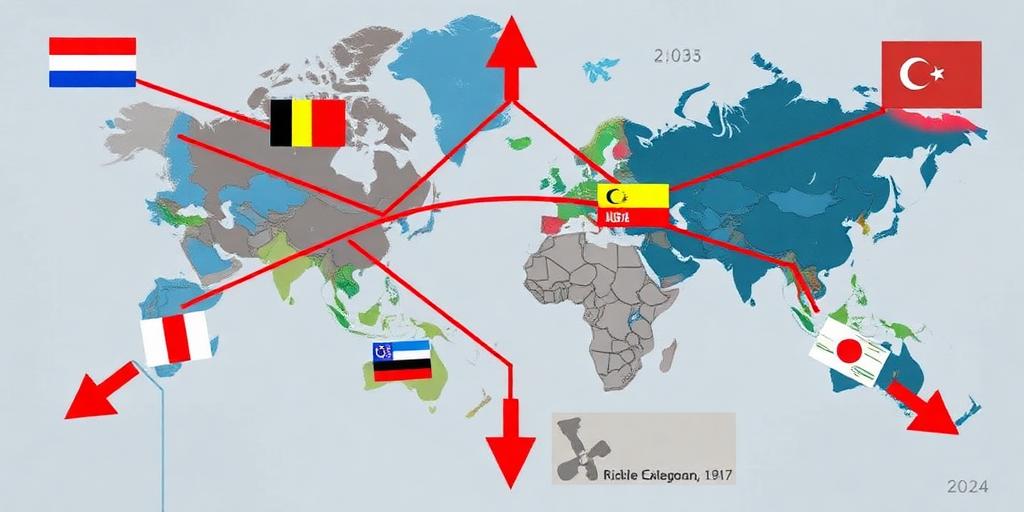Analyzing Geopolitical Alliances and Rivalries
In today's interconnected world, understanding the dynamics of geopolitical alliances and rivalries is crucial. These relationships shape international relations, influence economic policies, and often dictate the course of global events. This post will delve into the complexities of these alliances and rivalries, examining their formation, key players, and potential impacts.
What are Geopolitical Alliances?
Geopolitical alliances are agreements between two or more countries to cooperate on matters of mutual interest. These interests can range from security and defense to economic collaboration and cultural exchange. Alliances are often formed to:
- Enhance Security: Collective defense pacts, such as NATO, provide a framework for member states to support each other in the event of an attack.
- Promote Economic Growth: Trade agreements, like the European Union, aim to reduce barriers to trade and investment, fostering economic prosperity among member states.
- Address Global Challenges: Alliances can also be formed to tackle issues such as climate change, terrorism, and pandemics, pooling resources and expertise to achieve common goals.
Major Geopolitical Alliances in the 21st Century
Several key alliances dominate the current geopolitical landscape:
- NATO (North Atlantic Treaty Organization): A military alliance formed in 1949 to counter the Soviet Union, NATO remains a significant force in global security, particularly in Europe and North America.
- The European Union (EU): An economic and political union of European countries, the EU aims to promote peace, prosperity, and cooperation among its members.
- The Shanghai Cooperation Organisation (SCO): A Eurasian political, economic, and security alliance, the SCO includes countries like China, Russia, India, and Pakistan.
- ASEAN (Association of Southeast Asian Nations): A regional organization promoting economic, political, and security cooperation among Southeast Asian countries.
What are Geopolitical Rivalries?
Geopolitical rivalries are competitive relationships between countries or groups of countries, often characterized by conflicting interests, strategic competition, and sometimes, open hostility. These rivalries can be driven by:
- Territorial Disputes: Conflicts over land or maritime boundaries, such as the South China Sea dispute.
- Ideological Differences: Clashes between different political systems or values, such as the Cold War rivalry between the United States and the Soviet Union.
- Economic Competition: Struggles for market share, resources, and economic dominance.
- Geostrategic Influence: Competition for power and influence in key regions or globally.
Prominent Geopolitical Rivalries
Several rivalries shape the current geopolitical order:
- United States vs. China: A multifaceted rivalry encompassing trade, technology, military power, and ideological differences.
- India vs. Pakistan: A long-standing rivalry rooted in territorial disputes, historical grievances, and nuclear competition.
- Saudi Arabia vs. Iran: A regional rivalry driven by sectarian differences, competition for regional influence, and control over oil resources.
- Russia vs. NATO: A complex relationship marked by mutual distrust, military posturing, and competition for influence in Eastern Europe.
Factors Influencing Alliances and Rivalries
Several factors influence the formation and evolution of geopolitical alliances and rivalries:
- Economic Interdependence: Countries with strong economic ties are more likely to form alliances and less likely to engage in conflict.
- Political Ideology: Shared values and political systems can foster cooperation, while differing ideologies can fuel rivalry.
- Military Power: The distribution of military capabilities can influence the balance of power and shape alliance dynamics.
- Historical Relationships: Past conflicts and grievances can cast a long shadow on present-day relations.
- Leadership and Diplomacy: The skills and decisions of political leaders can play a crucial role in shaping alliances and managing rivalries.
The Impact of Alliances and Rivalries
Geopolitical alliances and rivalries have profound impacts on the world:
- Security and Stability: Alliances can deter aggression and maintain stability, while rivalries can escalate tensions and lead to conflict.
- Economic Development: Alliances can promote trade and investment, while rivalries can disrupt economic activity and hinder growth.
- International Norms and Institutions: Alliances and rivalries can shape the development and enforcement of international laws and norms.
- Global Governance: The dynamics of alliances and rivalries can influence the effectiveness of international organizations and efforts to address global challenges.
Conclusion
Understanding geopolitical alliances and rivalries is essential for navigating the complexities of the 21st-century world. These relationships shape global events and influence the lives of people around the globe. By analyzing the factors that drive alliances and rivalries, we can gain insights into the forces shaping our world and work towards a more peaceful and prosperous future.









